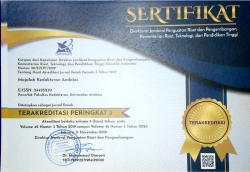PENDEKATAN PSIKONEUROIMUNOLOGI
Abstract
Abstrak
Psikoneuroimunologi merupakan konsep terintegrasi mengenai fungsi regulasi-imun untuk mempertahankan homeostasis. Untuk mempertahankan homeostasis, sistem imun berintegrasi dengan proses psikofisiologik otak, dan karena itu mempengaruhi dan dipengaruhi otak. Melalui pendekatan ini telah mulai dipahami mekanisme interaksi antara perilaku, sistem saraf, sistem endokrin, dan fungsi imun. Komponen perilaku dari interaksi ini melibatkan kondisioning Pavlov pada peningkatan maupun penekanan antibodi dan respon imun seluler. Kondisioning ini berekspresi sebagai efek pengalaman stress terhadap fungsi imun. Selanjutnya diketahui bahwa mekanisme terintegrasi ini berlangsung dalam ritme yang berkaitan dengan ritme lingkungan seperti ritme Sirkadian. Respon stress berkelanjutan berekspresi sebagai sindroma adaptasi umum. Sebagai respon akut dimulai dengan initial brief alarm reaction. Dalam tahap ini peningkatan sekresi cortisol pada aksis Hypothalamic-Pituitary-Adrenal (HPA) menimbulkan supresi pada sebagian besar fungsi imun dan peningkatan aktifitas sistem simpatis. Bila stress tidak dapat diatasi secara efektif, tahap kedua prolonged resistance period akan dimulai, dimana aktivasi aksis HPA akan menurun tetapi tidak pernah mencapai kondisi basal. Kegagalan berkelanjutan untuk mengatasi stress akan berakhir pada terminal stage of exhaustion and death. Aplikasi medis psikoneuroimunologi akan meningkatkan efektifitas terapi penyakit keganasan, gangguan kardiovaskular, penyakit infeksi, trauma fisik, transplantasi, dan gangguan jiwa.
Kata kunci: aksis HPA, antibodi, aplikasi medis, cortisol, homeostasis, melawan atau lari, otak, Pavlov, perilaku, psikofisiologik, psikoneuroimunologi, sindroma adaptasi umum, sistem imun, sistem LS-NA, respon stress, ritme Sirkadian
Abstract
Psychoneuroimmunology is an integrated concept of immune-regulatory function. To maintain homeostasis, the immune system is integrated with psychophysiological processes of the brain, and is therefore influenced by and capable of influencing the brain. Mechanism of interaction among behavior, neural, endocrine, and immune functions in adaptation to environmental stressors have come to light. The behavioral components of this interaction involve the Pavlov conditioning both in the enhancement and supression of antibody-and cell-mediated immune responses. This conditioning expressed as effects of stressful experiences on immune function. This integrated mechanism operated in a rhythm
TINJAUAN PUSTAKA
91
related to environmental rhythm such as Circadian rhythm. Prolonged stress response will be expressed as general adaptation syndrome. As an acute response it will begin with initial brief alarm reaction. In this stage increased cortisol secretion in Hypothalamic-pituitary-adrenal (HPA) axis resulted in supression of main immune function and arousal of sympathetic system If the stress can not be coped effectivelly, a second stage of prolonged resistance period will begin, in which HPA axis activation will be decreased but never reach the basal condition. Continued failure to cope with the stress will end in terminal stage of exhaustion and death.
Medical application of psychoimmunology can enchance the effectivity of the treatment of malignancy, cardiovascular disorder, infectious diseases, physical trauma, transplantation, and mental disorder.
Key word : antibody, behavioral, brain, Circadian rhythm, cortisol, fight or flight, general adaptation syndrome, homeostasis, HPA axis, immune system, LC-NA system, medical application, Pavlov, psychoneuroimmunology, psychophysiological, stress responses





















